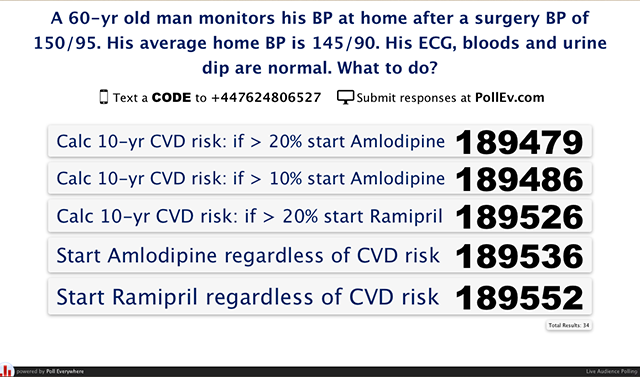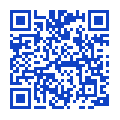
|
Authors | Institution |
|
Macdonald Alex |
Winchester University/Wessex NHS Deanery |
 |
|
||||||
| Using live internet polling during teaching sessions to answer multiple choice exam style questions |
The written component of the UK MRCGP examination, the Applied Knowledge Test, is a three-hour machine-marked test of 200 questions. The first-attempt failure rate is 22%. Many candidates feel inadequately prepared, yet simple tests fail to engage both the individual and the group. During revision tests, immediate expert-led discussion is desirable after each question. This is optimum if the facilitator is real-time aware of the answers to each question within that day's cohort. This project attempts to provide this optimum context for revision discussions.
At each teaching session, live internet-served polls were run on two topics, with three to five questions on each. Click on the image to see examples of this.

A code is shown against each answer. Each trainee then SMS texts his/her chosen code (see movie). No special hardware or software is needed. The server displays this live on-screen (hidden until they have answered). The expert instructor then steers teaching into areas of weakness.
.png) Polls were run for 31 trainees over 16 medical topics over a number of weeks. Anonymous feedback was taken midway through the project and again at its conclusion. They liked it! (See the 'more detail' link below.)
Polls were run for 31 trainees over 16 medical topics over a number of weeks. Anonymous feedback was taken midway through the project and again at its conclusion. They liked it! (See the 'more detail' link below.)
Here is an example of a live poll running on the server at www.polleverywhere.com. TRY IT NOW!
This dynamic e-learning approach allows students to compare themselves to their peers anonymously, with instant feedback in an enjoyable environment, with increased engagement, allowing the teaching session to be steered live towards evidenced areas of need while the alternatives are fresh in the trainees' minds.
Live mobile-phone polling can provide the reactive rapid discussion and feedback that preparation for written medical examinations often requires.
 Send Email
Send Email



